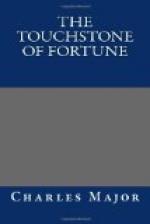“Your philosophy wearies me,” she answered petulantly.
“In that case, I’ll confine my remarks to facts and to a mere statement of your duty. You must have money. Accept the king’s pension and laugh at him.”
“I’ll not take your advice,” she retorted angrily. “I’ll return to my father’s house at once. He was right. A decent woman has no business at court.”
“Since you speak so plainly, I’ll do likewise,” I rejoined, growing angry. “You came to court to make your fortune by marriage. That is a bald, ugly way to state the case, but it is the truth. Admit it.”
“I fear I must,” she answered, hanging her head.
“You surely could not ask greater progress toward your desire than you are making,” I continued. “You came into favor at a bound, and have been growing each day, not only with the king, but with all the court, including the queen, the duchess, and the duke. Every one loves you and, better still, respects you, which is a distinction few beautiful women enjoy nowadays. Dick Talbot, the Duke of Tyrconnel, the richest unmarried nobleman in England, is eager to marry you, and would ask you to be his wife if you would but throw him a smile.”
“I hate him!” she retorted impatiently. “An overgrown Irish fool. One would as well marry a bull calf!”
“But he is as decent as any man I know, and will meet all your purposes in coming to court in the matter of wealth and station. I don’t know that it is a misfortune for a woman to marry a man she can rule.”
“Yes, it is,” she answered. “She always despises him. I should prefer one who would beat me to such a man.”
“But if you intend to carry out the purpose you had in coming to court, you—”
But she interrupted me, speaking slowly, almost musingly: “The purpose I had, perhaps, but not the one I have. I did not know myself. I did not know. I doubt if any girl does. I don’t want to marry any man.”
“Is it because another man fills your heart?” I asked, speaking gently. “Tell me, my beautiful sister, tell me. I’ll find no fault with you. I’ll help you if I can.”
I received a sigh for my answer, and another and another, as she walked by my side, hanging her head. But when I urged her to speak, she raised her eyes to mine, and there was a cold, angry glint in them as she asked:—
“Do you mean—?”
She did not mention Hamilton’s name, but I knew whom she meant and answered:—
“Yes.”
A long pause followed, during which I was unable to read the expression on her face, but presently she spoke, her voice trembling with anger or emotion, I knew not which:—
“I hate him! If he were to touch my hand, I believe I should want to cut it off! I hate him—that is, I try to hate him.”
Her words and manner caused me uneasiness in two respects: first, it led me to fear that she loved Hamilton; and second, in view of the rumors I had heard connecting his name with Roger Wentworth’s death, it flashed upon me that possibly he was the man she had recognized by the light of Noah’s lanthorn. Either of these surmises, if true, was enough to mar my peace of mind, but together they brought me trouble indeed.




